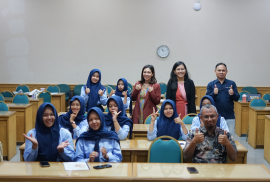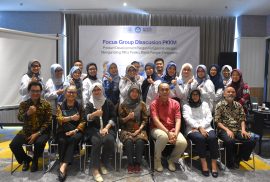
In a proactive step toward increasing awareness of the importance of mental health and building a supportive and inclusive learning environment, the Department of Food and Agricultural Product Technology (TPHP), Universitas Gadjah Mada, recently held a mental health training session themed “Gen Z: Masalah dan Potensinya” (Gen Z: Their Problems and Potential). This session was designed to increase awareness and build practical skills in recognizing and responding to mental health issues among students, especially those from Gen Z.
The training invited expert speaker Mrs. Sylvi Dewanjani, M.Sc., Psychologist, who currently serves as the Head of the Yogyakarta Regional Commission for Child Protection (KPAID). Drawing from her extensive professional experience, Ms. Sylvi shared key characteristics of Generation Z and the common psychological challenges they face. Through real case examples, she highlighted recurring issues such as academic misalignment, communication breakdowns with parents and faculty members, and mental blocks that often lead to frustration and overwhelming social pressure. “We cannot afford to parent or teach on autopilot anymore,” Ms. Sylvi emphasized. “Young people today need evidence, not just instructions.”

A critical part of the training addressed the sensitive but vital topic of self-harm and suicide. She explained that self-harm often arises as a coping mechanism to relieve psychological tension by redirecting emotional pain into physical pain. In contrast, suicidal thoughts are typically rooted in a profound sense of hopelessness. When supporting students experiencing these challenges, she emphasized the importance of listening without judgment, expressing empathy, and avoiding moralizing language or clichéd phrases. A thoughtful and compassionate response, she noted, can be a crucial bridge to prevent a more profound crisis.
One of the key messages highlighted during the training was the importance of having a structured mental health support system within the university setting. Measures such as early-semester mental health screenings, close monitoring of high-risk individuals, and a clear referral pathway to professional services were identified as essential components. Additionally, the use of positive, supportive language plays a significant role in creating a sense of safety and respect for students navigating mental health difficulties.
Through this training, the Department of Food and Agricultural Product Technology (TPHP) at Universitas Gadjah Mada reaffirmed its commitment to cultivating a learning environment that not only promotes academic achievement but also prioritizes the mental well-being of its entire community.
Written by: Firstnandita K




